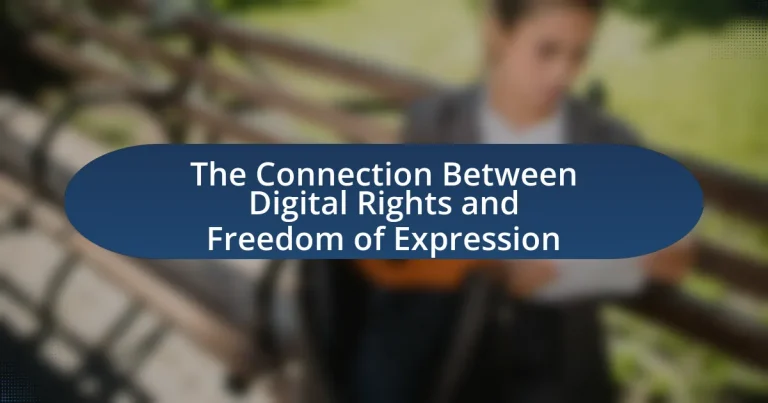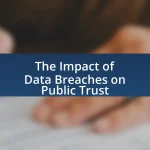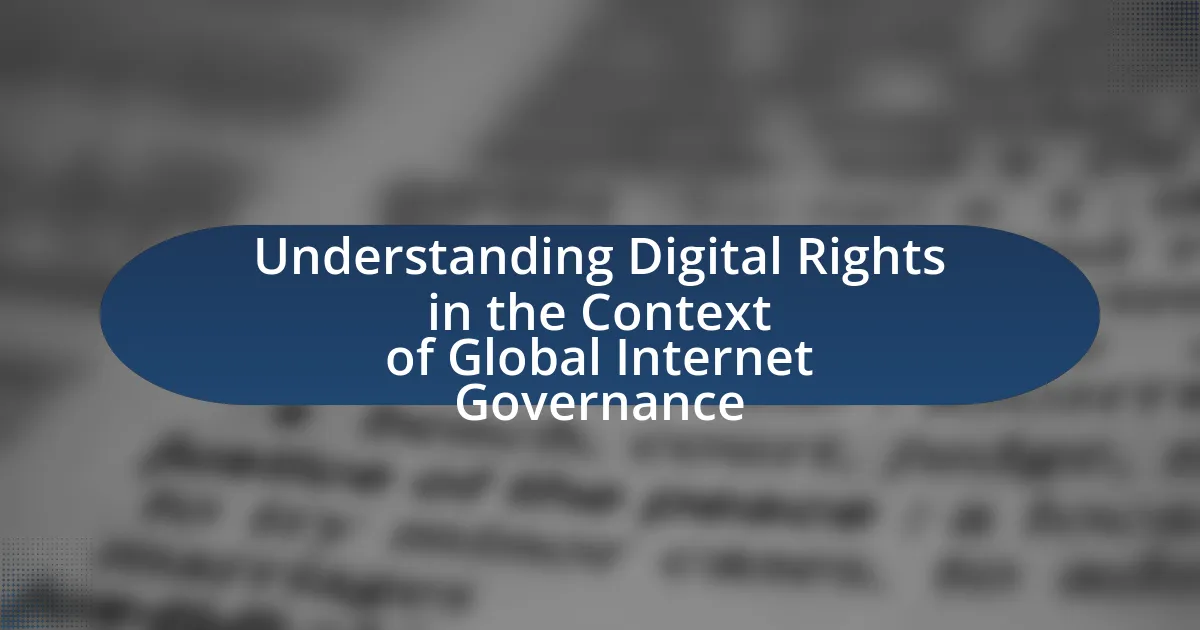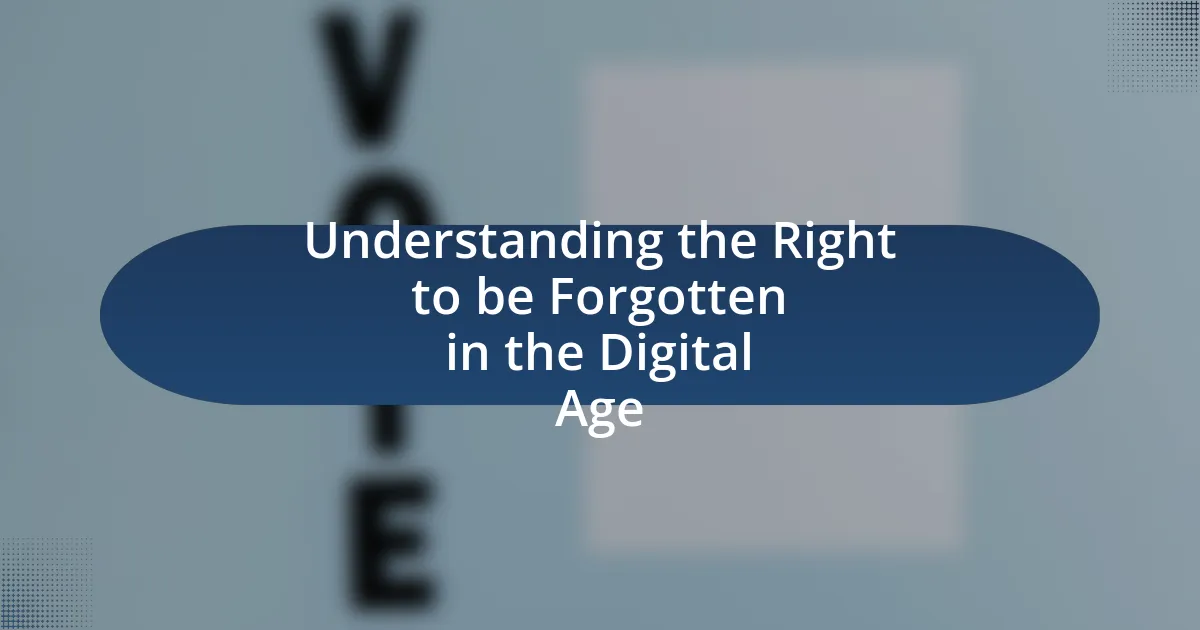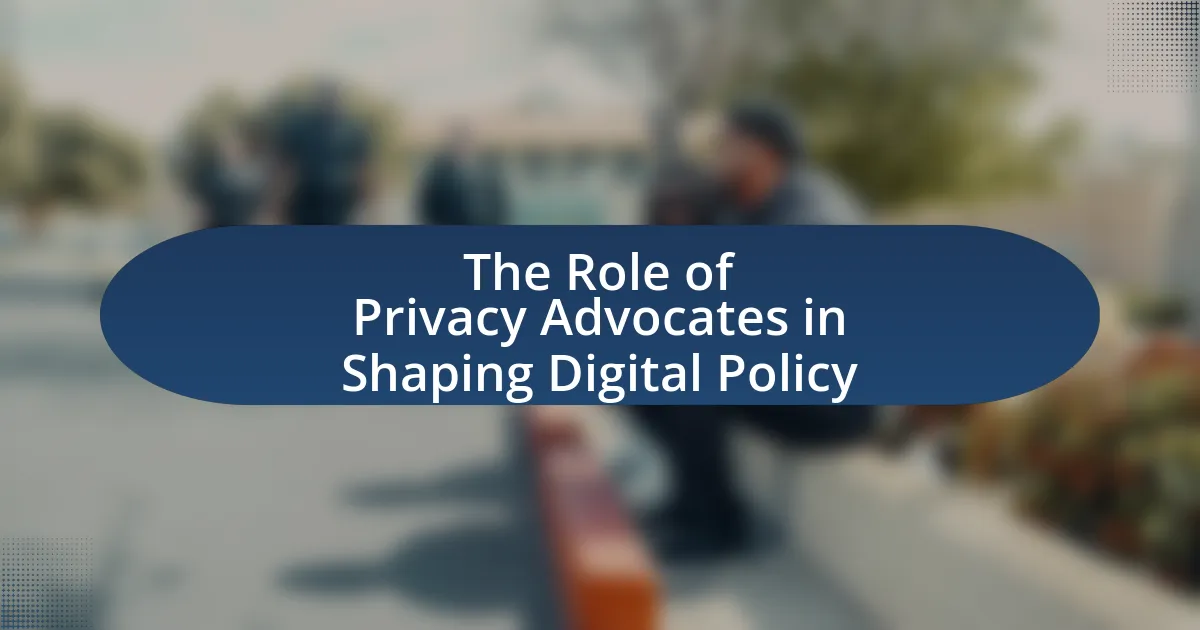The article explores the intrinsic connection between digital rights and freedom of expression, emphasizing that digital rights encompass the ability to access, use, create, and share information freely online. It outlines how digital rights influence freedom of expression by protecting individuals from censorship and surveillance, thereby fostering a diverse public discourse. Key components of digital rights, such as access to information, privacy, and digital security, are discussed in relation to their importance for exercising freedom of expression. The article also addresses the challenges faced in protecting these rights, including government censorship and corporate control, and highlights the implications for individuals and society as a whole. Finally, it presents strategies for enhancing digital rights and freedom of expression, including advocacy, legal frameworks, and individual best practices.
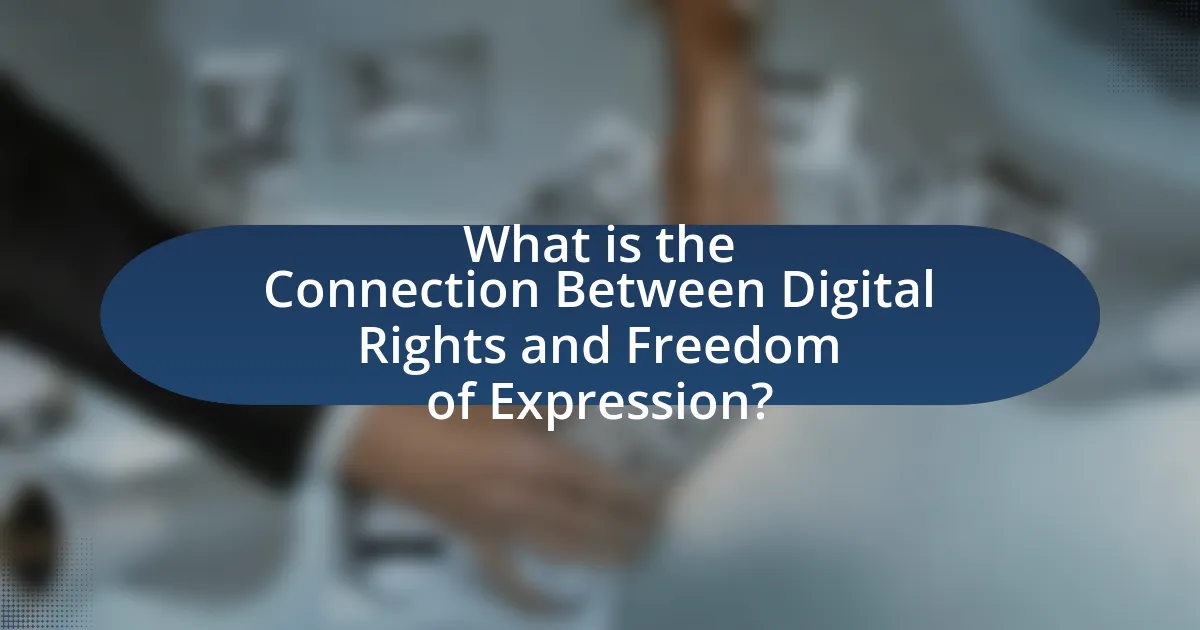
What is the Connection Between Digital Rights and Freedom of Expression?
Digital rights and freedom of expression are intrinsically linked, as digital rights encompass the ability to access, use, create, and share information freely online. This connection is vital because freedom of expression is a fundamental human right recognized in international law, such as Article 19 of the Universal Declaration of Human Rights, which states that everyone has the right to freedom of opinion and expression. Digital rights ensure that individuals can exercise this freedom without censorship or restriction in the digital space. Furthermore, the rise of the internet has made it essential to protect these rights, as online platforms serve as primary venues for public discourse and expression. Thus, safeguarding digital rights directly supports and enhances the exercise of freedom of expression in the digital age.
How do digital rights influence freedom of expression?
Digital rights significantly influence freedom of expression by ensuring individuals have access to the internet and the ability to communicate freely online. These rights protect users from censorship, surveillance, and restrictions imposed by governments or corporations, thereby fostering an environment where diverse opinions can be shared and debated. For instance, the United Nations Human Rights Council has affirmed that the same rights people have offline must also be protected online, emphasizing that digital rights are essential for the exercise of freedom of expression.
What are the key components of digital rights?
The key components of digital rights include the right to access information, the right to privacy, the right to freedom of expression, and the right to digital security. These components ensure that individuals can freely access and share information online, maintain their privacy in digital interactions, express their opinions without censorship, and protect themselves from cyber threats. For instance, the Universal Declaration of Human Rights recognizes freedom of expression as a fundamental human right, which extends to digital platforms, emphasizing the importance of these components in safeguarding individual liberties in the digital age.
How do these components relate to freedom of expression?
Digital rights components, such as access to information, privacy, and the ability to communicate freely online, are fundamental to the exercise of freedom of expression. These components ensure that individuals can share ideas, opinions, and information without undue interference or censorship. For instance, the United Nations Human Rights Council has affirmed that the same rights people have offline must also be protected online, emphasizing that restrictions on digital rights can directly undermine freedom of expression.
Why is the connection between digital rights and freedom of expression important?
The connection between digital rights and freedom of expression is important because digital rights ensure individuals can freely express themselves online without censorship or repression. This relationship is crucial in a digital age where communication increasingly occurs through online platforms, making it essential for democratic participation and the exchange of ideas. According to the United Nations Human Rights Council, the promotion and protection of human rights, including freedom of expression, must be upheld in the digital realm, as outlined in Resolution 20/8. This resolution emphasizes that the same rights people have offline must also be protected online, reinforcing the necessity of safeguarding digital rights to maintain freedom of expression.
What implications does this connection have for individuals?
The connection between digital rights and freedom of expression has significant implications for individuals, primarily ensuring their ability to communicate freely and access information without censorship. This connection empowers individuals to express their opinions, share ideas, and participate in public discourse, which is essential for democratic engagement. For instance, the United Nations recognizes freedom of expression as a fundamental human right, stating that it is crucial for the realization of other rights and freedoms. Furthermore, when digital rights are upheld, individuals can utilize various online platforms to voice dissent, mobilize for social change, and hold authorities accountable, thereby enhancing civic participation and societal progress.
How does this connection affect society as a whole?
The connection between digital rights and freedom of expression significantly impacts society by ensuring that individuals can freely share information and ideas online without censorship. This freedom fosters a more informed public, encourages diverse viewpoints, and promotes democratic engagement. For instance, the United Nations Human Rights Council recognizes that the internet is a vital platform for exercising freedom of expression, as stated in Resolution 20/8, which emphasizes the importance of access to information and the protection of online speech. Consequently, societies that uphold digital rights tend to experience greater social cohesion and innovation, as citizens feel empowered to participate in discussions and advocate for change.
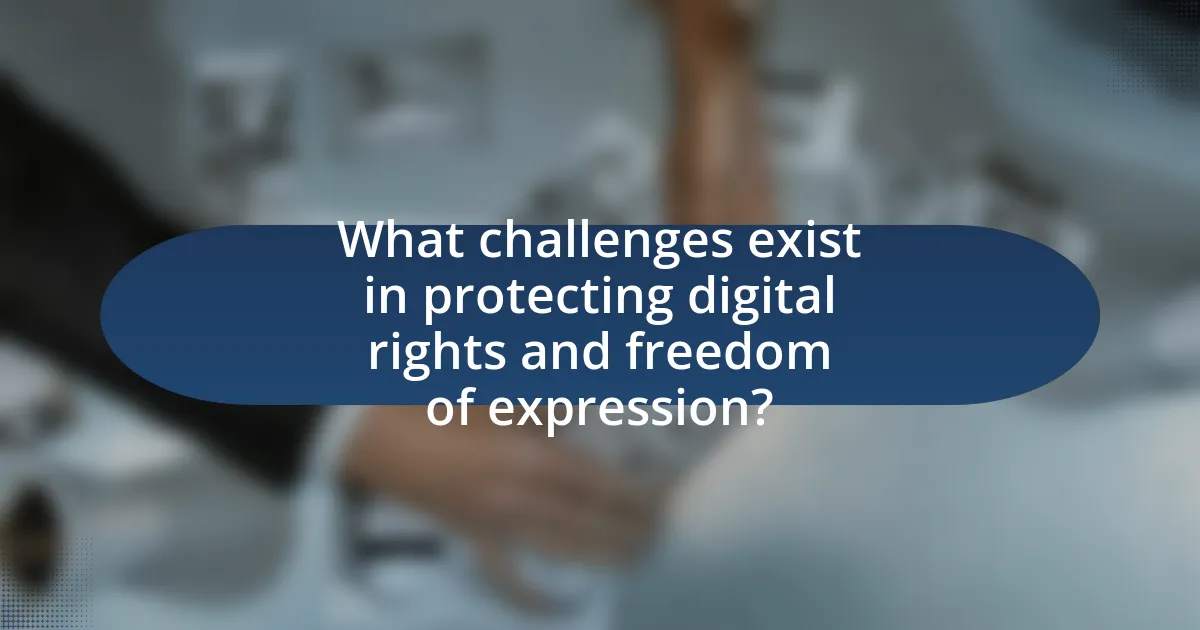
What challenges exist in protecting digital rights and freedom of expression?
Challenges in protecting digital rights and freedom of expression include government censorship, surveillance, and the monopolistic control of digital platforms. Governments often impose restrictions on online content to suppress dissent, as seen in countries like China and Iran, where strict regulations limit free speech. Surveillance practices, such as those revealed by Edward Snowden, demonstrate how state monitoring can deter individuals from expressing their opinions freely. Additionally, major tech companies, like Facebook and Google, wield significant power over what content is accessible, leading to concerns about biased moderation and the suppression of diverse viewpoints. These factors collectively hinder the ability to safeguard digital rights and ensure robust freedom of expression in the digital age.
What are the main threats to digital rights?
The main threats to digital rights include government surveillance, data privacy violations, censorship, and cyberattacks. Government surveillance undermines individual privacy and freedom of expression, as seen in cases like the NSA revelations, which highlighted extensive monitoring of online communications. Data privacy violations occur when companies mishandle personal information, exemplified by incidents such as the Facebook-Cambridge Analytica scandal, where user data was exploited without consent. Censorship, often enforced by governments or corporations, restricts access to information and stifles free speech, as evidenced by internet shutdowns in countries like Iran during protests. Lastly, cyberattacks threaten the integrity of digital platforms and can lead to the suppression of dissenting voices, as demonstrated by attacks on media outlets and activists.
How do government regulations impact digital rights?
Government regulations significantly impact digital rights by establishing legal frameworks that can either protect or restrict online freedoms. For instance, laws such as the General Data Protection Regulation (GDPR) in the European Union enhance individuals’ rights to privacy and data protection, thereby empowering users in the digital space. Conversely, regulations like the Communications Decency Act in the United States can lead to censorship and limit freedom of expression by holding platforms accountable for user-generated content. These regulations shape the landscape of digital rights, influencing how individuals interact with technology and express themselves online.
What role do private companies play in this context?
Private companies play a crucial role in shaping the landscape of digital rights and freedom of expression by providing platforms for communication and content sharing. These companies, such as social media networks and internet service providers, influence what information is accessible to users and how it is disseminated. For instance, policies implemented by companies like Facebook and Twitter directly affect users’ ability to express themselves freely online, as these platforms enforce community guidelines that can restrict certain types of speech. Additionally, private companies often collaborate with governments on content moderation, which can lead to censorship or the suppression of dissenting voices. This dynamic highlights the significant impact that corporate policies and practices have on the exercise of digital rights and the overall health of public discourse.
How do these challenges affect freedom of expression?
Challenges such as censorship, surveillance, and misinformation significantly undermine freedom of expression. Censorship restricts individuals from sharing their thoughts and opinions, leading to a homogenization of discourse. Surveillance creates a chilling effect, where individuals self-censor due to fear of being monitored, thus stifling open communication. Misinformation complicates the landscape by obscuring truth and manipulating public perception, which can lead to the suppression of legitimate voices. According to a report by Freedom House, countries with high levels of internet censorship often experience a decline in overall freedom of expression, highlighting the direct correlation between these challenges and the erosion of this fundamental right.
What are the consequences of restricted freedom of expression online?
Restricted freedom of expression online leads to significant consequences, including the suppression of dissenting voices and the stifling of public discourse. When individuals cannot freely express their opinions, it results in a lack of diverse perspectives, which is essential for a healthy democratic society. Research by the Pew Research Center indicates that 64% of Americans believe that online platforms should allow users to express their opinions freely, highlighting the public’s recognition of the importance of free expression. Furthermore, restricted expression can lead to increased self-censorship, where individuals refrain from sharing their thoughts due to fear of repercussions, ultimately diminishing the quality of information available to the public. This environment can foster misinformation, as individuals may turn to unregulated sources for information, further complicating the landscape of public knowledge.
How can individuals and organizations respond to these challenges?
Individuals and organizations can respond to challenges related to digital rights and freedom of expression by advocating for policy changes and promoting digital literacy. Advocacy efforts can include lobbying for stronger legal protections for online speech and opposing censorship measures. For instance, organizations like the Electronic Frontier Foundation have successfully influenced legislation to safeguard digital rights. Additionally, promoting digital literacy equips individuals with the skills to navigate online platforms responsibly and understand their rights, which is crucial in combating misinformation and fostering informed discourse.
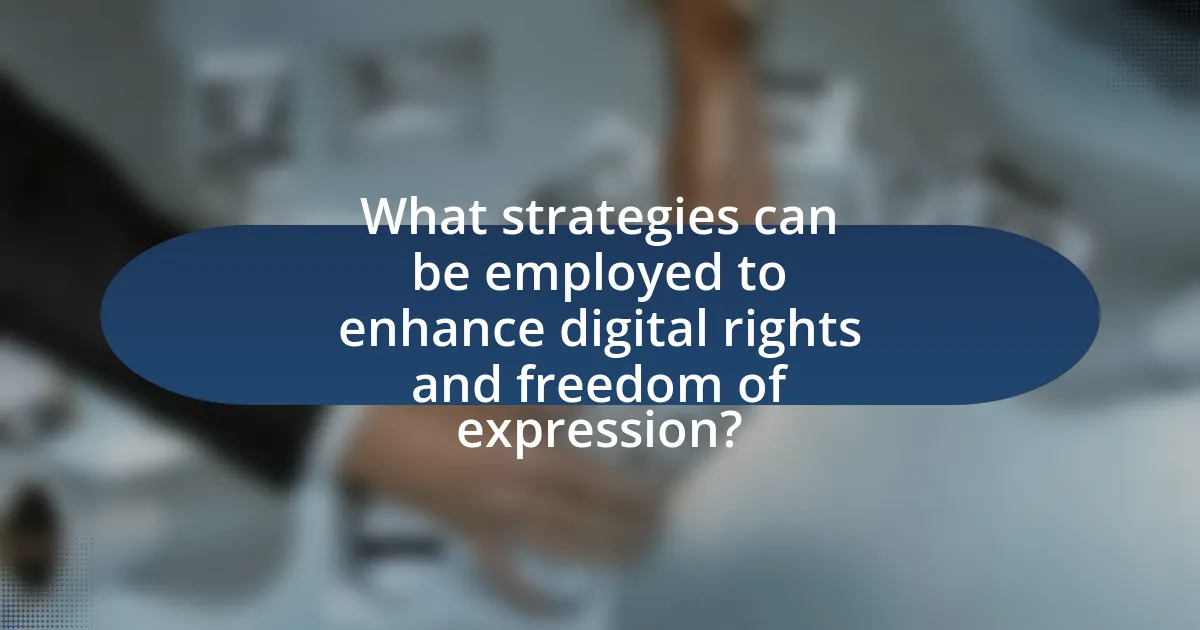
What strategies can be employed to enhance digital rights and freedom of expression?
To enhance digital rights and freedom of expression, implementing robust legal frameworks that protect online speech is essential. Countries can adopt laws that explicitly safeguard individuals’ rights to express themselves freely on digital platforms, ensuring that these laws are aligned with international human rights standards, such as the International Covenant on Civil and Political Rights. Additionally, promoting digital literacy among citizens empowers them to understand their rights and navigate online spaces safely. Research indicates that countries with strong legal protections and active civil society engagement see higher levels of freedom of expression online, as evidenced by the Freedom House report, which highlights the correlation between legal frameworks and digital rights. Furthermore, fostering collaboration between governments, tech companies, and civil society can lead to the development of policies that prioritize user privacy and security, thereby enhancing trust in digital communication channels.
What best practices can individuals adopt to protect their digital rights?
Individuals can adopt several best practices to protect their digital rights, including using strong, unique passwords and enabling two-factor authentication. Strong passwords reduce the risk of unauthorized access, while two-factor authentication adds an extra layer of security, making it harder for attackers to compromise accounts. Additionally, individuals should regularly review privacy settings on social media and other online platforms to control who can access their information. According to a 2021 report by the Electronic Frontier Foundation, adjusting privacy settings can significantly enhance personal data protection. Furthermore, individuals should be cautious about sharing personal information online and be aware of phishing scams, as these tactics are commonly used to exploit digital rights. By staying informed about digital rights and utilizing available tools, individuals can better safeguard their online presence.
How can users safeguard their online privacy?
Users can safeguard their online privacy by employing strong passwords, utilizing two-factor authentication, and using virtual private networks (VPNs). Strong passwords, which include a mix of letters, numbers, and symbols, significantly reduce the risk of unauthorized access; studies show that 81% of data breaches are linked to weak passwords. Two-factor authentication adds an extra layer of security by requiring a second form of verification, making it harder for attackers to gain access even if they have the password. VPNs encrypt internet traffic, protecting users’ data from potential eavesdroppers, especially on public Wi-Fi networks. By implementing these strategies, users can effectively enhance their online privacy and protect their personal information from unauthorized access.
What tools are available for promoting freedom of expression online?
Tools available for promoting freedom of expression online include social media platforms, encrypted messaging apps, and virtual private networks (VPNs). Social media platforms like Twitter and Facebook allow users to share their thoughts and opinions widely, fostering public discourse. Encrypted messaging apps such as Signal and WhatsApp protect user privacy, enabling secure communication without fear of surveillance. VPNs help users bypass censorship and access blocked content, ensuring that individuals can express themselves freely regardless of geographic restrictions. These tools collectively enhance the ability of individuals to communicate openly and access diverse viewpoints, which is essential for a healthy democratic society.
What role do advocacy groups play in this area?
Advocacy groups play a crucial role in promoting and protecting digital rights and freedom of expression by raising awareness, influencing policy, and mobilizing public support. These organizations, such as the Electronic Frontier Foundation and Access Now, actively engage in campaigns to safeguard individuals’ rights online, challenge restrictive laws, and hold governments and corporations accountable for violations. For instance, advocacy groups have successfully lobbied for legislation that enhances privacy protections and combats censorship, demonstrating their impact on shaping a more open digital environment.
How can these groups effectively promote digital rights?
Groups can effectively promote digital rights by advocating for policy changes, raising public awareness, and engaging in legal challenges. Advocacy for policy changes involves lobbying governments to adopt laws that protect digital rights, such as data privacy regulations and net neutrality. Raising public awareness through campaigns and educational initiatives informs citizens about their digital rights and the implications of digital surveillance. Engaging in legal challenges allows these groups to contest unjust laws and practices in court, setting precedents that strengthen digital rights protections. For instance, organizations like the Electronic Frontier Foundation have successfully challenged government surveillance practices, reinforcing the importance of digital rights in the context of freedom of expression.
What initiatives have been successful in enhancing freedom of expression?
Successful initiatives that have enhanced freedom of expression include the establishment of legal frameworks that protect journalists and whistleblowers, such as the European Union’s Whistleblower Protection Directive, which safeguards individuals who report misconduct. Additionally, organizations like Article 19 advocate for the protection of free speech globally, influencing policy changes in various countries. The implementation of internet freedom initiatives, such as the Global Internet Freedom Act in the United States, has also contributed to safeguarding online expression by promoting access to information and opposing censorship. These initiatives have been effective in creating environments where individuals can express their opinions without fear of retaliation or censorship.
What practical steps can individuals take to support digital rights and freedom of expression?
Individuals can support digital rights and freedom of expression by advocating for policies that protect online privacy and free speech. Engaging in campaigns that promote legislation, such as the General Data Protection Regulation (GDPR) in Europe, demonstrates the importance of safeguarding personal data and ensuring individuals have control over their information. Additionally, individuals can participate in digital literacy programs to educate themselves and others about online rights, which empowers communities to recognize and challenge violations. Supporting organizations like the Electronic Frontier Foundation (EFF) or Access Now, which actively work to defend digital rights, further amplifies collective efforts. By using secure communication tools and promoting their use, individuals can also protect their own privacy and encourage others to do the same, fostering a culture of respect for digital rights.
